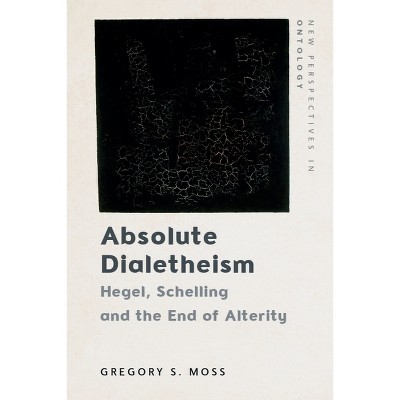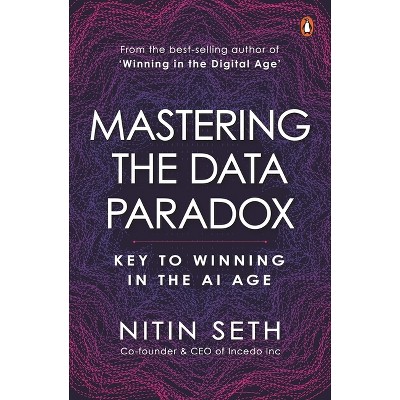Sponsored

The Meritocracy Paradox - by Emilio J Castilla (Hardcover)
$27.28Save $5.67 (17% off)
In Stock
Eligible for registries and wish lists
Sponsored
About this item
Highlights
- Shortlisted, 2025 Talent Award, Thinkers50 Meritocracy--the idea that individuals should be rewarded based on their talent and hard work--is one of the most widely celebrated ideals in education, business, and government.
- About the Author: Emilio J. Castilla is the NTU Professor of Management and a professor of work and organization studies at the MIT Sloan School of Management.
- 376 Pages
- Business + Money Management, Organizational Behavior
Description
About the Book
Emilio J. Castilla analyzes the structure and culture of meritocracy inside organizations, providing a practical, research-backed framework to help achieve true fairness and opportunity for all.Book Synopsis
Shortlisted, 2025 Talent Award, Thinkers50
Meritocracy--the idea that individuals should be rewarded based on their talent and hard work--is one of the most widely celebrated ideals in education, business, and government. It shapes how organizations recruit, evaluate, and promote, promising a fair system where the best rise to the top. But meritocracy has increasingly come under criticism for deepening inequality and reinforcing bias. How did a once-progressive ideal meant to level the playing field end up contributing to unfairness and privilege? What happens when organizations treat merit as their guiding principle without questioning how it's defined or applied? Most importantly, how can today's leaders recognize and fix what's gone wrong? In The Meritocracy Paradox, Emilio J. Castilla offers timely new answers to these fundamental questions. He analyzes the structure and culture of meritocracy inside organizations, providing real-world examples--from hiring and merit-based bonuses in companies to admissions decisions at elite universities--to show how personal biases and social barriers can undermine the values and outcomes these systems are meant to uphold. Castilla provides practical, research-backed frameworks to help organizations achieve true fairness and opportunity for all. Drawing on successful data-based interventions, he presents concrete strategies for improving recruitment, selection, evaluation, promotion, and compensation processes--revealing how motivated leaders can identify and correct shortcomings with cost-effective, targeted solutions that deliver proven results. The Meritocracy Paradox is essential reading for anyone seeking to understand and improve the intersection of merit, fairness, and equal opportunity in organizations.Review Quotes
The Meritocracy Paradox is an extremely timely account of how we should consider merit in the workplace--and why we typically don't--that has the rare combination of being academically rigorous, insightful, and also fun to read. Highly recommended.--Peter Cappelli, author of Our Least Important Asset: Why the Relentless Focus on Finance and Accounting Is Bad for Business and Employees
Blending rigorous empirical work, compelling theoretical insights, and thoughtful practical guidance, The Meritocracy Paradox is essential reading for organizations seeking to improve their talent-management systems as well as scholars seeking to understand the complex ways that meritocracy actually operates within the world of work.--David S. Pedulla, author of Making the Cut: Hiring Decisions, Bias, and the Consequences of Nonstandard, Mismatched, and Precarious Employment
Castilla leverages rigorous research to document how and why meritocratic ideals have failed to ensure equal opportunity, and he proposes workable recommendations for making workplaces fairer. His analysis is particularly resonant in the current milieu. This timely book merits close attention--from business and education leaders, policy makers, scholars, and anyone else seeking more effective organizations and a more just society.--James Baron, William S. Beinecke Professor of Management, Yale School of Management
In The Meritocracy Paradox, Castilla offers a timely exploration of the promise--and hidden perils--of meritocracy in contemporary organizations. Drawing on decades of rigorous research, he reveals with clarity and insight how even the best-intentioned practices can unintentionally reinforce inequality. This book equips readers with practical, evidence-based strategies to ensure that workplace personnel decisions are fair and effective. A must-read for scholars, managers, and anyone committed to building better organizations.--Lauren A. Rivera, author of Pedigree: How Elite Students Get Elite Jobs
Meritocracy is an ideal for most of us. Yet in the pursuit of that ideal, we easily blind ourselves to many forms of unfairness. Castilla's illuminating book, based on decades of research, shows what it takes to achieve a true meritocracy--and the many traps to avoid along the way. A cautionary tale and essential guidebook for the current times, it will open your eyes to how real fairness operates.--Herminia Ibarra, The Charles Handy Professor of Organisational Behaviour, London Business School
The Meritocracy Paradox is a landmark contribution from one of the most insightful organizational scholars of our time. With empirical precision and deep humanity, Castilla gives us a practical, evidence-based guide to understanding how fairness falters in business, education, and government--and how we can still get it right.--András Tilcsik, coauthor of Meltdown: Why Our Systems Fail and What We Can Do About It
The ideal of meritocracy is fundamental to organizations' ability to attract and retain talented workers yet is often not achieved in practice. Drawing on extensive research, this book provides valuable insights as to how organizations can truly promote high performance, fairness, diversity, and opportunity for all.--Arne L. Kalleberg, Kenan Distinguished Professor of Sociology, University of North Carolina at Chapel Hill
About the Author
Emilio J. Castilla is the NTU Professor of Management and a professor of work and organization studies at the MIT Sloan School of Management. He is codirector of the MIT Institute for Work and Employment Research. Castilla's research focuses on organizations, networks, and workplace inequality, with a particular emphasis on the social dynamics of work and employment.Dimensions (Overall): 9.3 Inches (H) x 6.0 Inches (W) x 1.3 Inches (D)
Weight: 1.5 Pounds
Suggested Age: 22 Years and Up
Number of Pages: 376
Genre: Business + Money Management
Sub-Genre: Organizational Behavior
Publisher: Columbia University Press
Format: Hardcover
Author: Emilio J Castilla
Language: English
Street Date: September 2, 2025
TCIN: 1003232963
UPC: 9780231208420
Item Number (DPCI): 247-39-9509
Origin: Made in the USA or Imported
If the item details aren’t accurate or complete, we want to know about it.
Shipping details
Estimated ship dimensions: 1.3 inches length x 6 inches width x 9.3 inches height
Estimated ship weight: 1.5 pounds
We regret that this item cannot be shipped to PO Boxes.
This item cannot be shipped to the following locations: American Samoa (see also separate entry under AS), Guam (see also separate entry under GU), Northern Mariana Islands, Puerto Rico (see also separate entry under PR), United States Minor Outlying Islands, Virgin Islands, U.S., APO/FPO
Return details
This item can be returned to any Target store or Target.com.
This item must be returned within 90 days of the date it was purchased in store, shipped, delivered by a Shipt shopper, or made ready for pickup.
See the return policy for complete information.
Frequently bought together

Trending Non-Fiction


$18.28
was $19.58 New lower price
4.7 out of 5 stars with 17 ratings














